Obtaining funding for research is one of the most challenging tasks for any biomedical researcher. At the UConn School of Medicine, three MD/Ph.D. students have gotten an early start on this process, receiving competitive fellowship awards that will support their clinical and research training.
Justin Kirkham, a seventh-year MD/Ph.D. student, Sonali Bracken, a sixth-year student, and Alexander Adami, a fifth-year student, recently received prestigious National Research Service Awards (NRSAs) from the National Institutes of Health (NIH), the primary source of funding for biomedical research in the United States. NRSAs are a group of grants funded by the NIH to support trainees and young investigators. The awards received by these UConn students, termed F30 Fellowships, are designed specifically to support future physician-scientists, or those doctors who combine treating the sick and injured with a career researching the causes of and cures for the diseases they see in patients.
“I am so proud of our students for their achievements, particularly in a time of such great competition for research funding” says Carol Pilbeam, MD, Ph.D., director of the UConn MD/PhD Program. “Writing a strong grant proposal is very difficult, and obtaining this experience so early in their careers is excellent preparation for future success when they start their own laboratories.” The MD/Ph.D. Program encourages its students to apply for national fellowships, and Dr. Pilbeam has created a recurring workshop series to help students preparing their own fellowship proposals. Says Dr. Pilbeam, “Even if a student is not successful in obtaining an NRSA, the experience of writing the proposal will benefit students long after they graduate.”
The work of these three students spans the domains of medicine and science. Justin Kirkham and his mentor, Arthur Gunzl, Ph.D., are untangling the complex genetics of Trypanosoma brucei, the cause of lethal Human African Trypanosomiasis, commonly termed Sleeping Sickness, and a similar disease in livestock, nagana. Many researchers have sought to develop more effective therapies targeting the T. brucei parasite, without much success.
Justin’s F30 research, funded by the National Institute for Allergy and Infectious Diseases, explores a key protein expressed by the parasite, termed class I transcription factor A (CITFA). The CITFA complex is required for the parasite to evade the human immune system, which it does by periodically changing its cell surface coat. This mechanism, termed Antigenic Variation, is a widespread strategy of pathogens to persist in their hosts. The goal of Justin’s research is to analyze how it works in trypanosomes, which may someday allow for new therapies. “In order to treat Trypanosomiasis effectively, we have to understand it better” says Justin. “This grant has helped both to focus and further my investigation, and it is my hope that this work will bring us closer to a day when Africa is no longer oppressed by this terrible disease.”
For Sonali Bracken, earning a fellowship has renewed her dedication to a physician-scientist career. “The NIH is investing in you and your ideas when they award an F30 fellowship, and that recognition is so rewarding at a time when I am working hard to write my PhD dissertation and prepare to return to my medical studies” notes Sonali. Her research focus is asthma and specifically the disease processes of asthma caused by house dust mite (HDM), the most common human allergen worldwide. Sonali is undertaking her dissertation work in the laboratory of Roger S. Thrall, Ph.D., a member of the Department of Immunology who has long studied asthma. With funding from the National Heart, Lung, and Blood Institute (NHLBI), Sonali has developed a new animal model of HDM-induced asthma and has explored the role of alveolar macrophages, a type of white blood cell that patrols the lungs and airways, in asthma.
Members of the Thrall Laboratory including from left, MD/Ph.D. student Alex Adami, lab manager Linda Guernsey, MD/Ph.D. student Sonali Bracken, and principal investigator Roger Thrall, Ph.D.In addition to her work on the basic mechanisms of asthma, Sonali is also exploring allergen-specific immunotherapy (SIT), a poorly-understood treatment that may someday help cure asthma. She aspires to a career as an academic physician-scientist and will someday apply her immunology training to a career as a hematologist-oncologist. Her fellowship will be a major asset as she advances in her training. Says Sonali, “I will be applying to competitive residency and fellowship programs in a few years, and having NIH support is an important achievement, especially for programs that focus on training physician-scientists.”
Alex Adami, who is also pursuing his PhD in the laboratory of Dr. Thrall, is studying the microbiome and its influence on asthma. “The microbiome is the community of microorganisms, including bacteria, fungi, and viruses, that live on and inside all of us. Understanding how the microbiome influences our health is one of the major challenges of modern medical science” explains Alex. “Many scientists now suspect that rising levels of asthma and other allergic diseases are in part due to disruption of our microbiomes, such as that caused by excessive antibiotic use.”
Alex’s project, funded by NHLBI, links the laboratory of Dr. Thrall with expertise in next-generation sequencing from Joerg Graf, Ph.D., associate professor of molecular and cell biology and director of the Microbial Analysis, Resources and Services facility. Alex’s work has uncovered evidence that the microbiome changes as asthma develops, and he hopes to find a way to harness our microbiomes to combat asthma. “It is a real privilege to be selected for an NRSA” says Alex. “Our applications were competing with hundreds of others from students across the country, and it is very gratifying to see that our work stands equal to the very best research being done at any other institution.
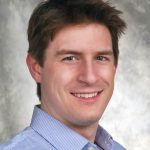
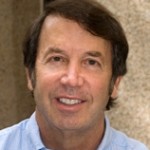
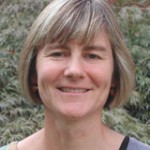
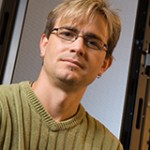
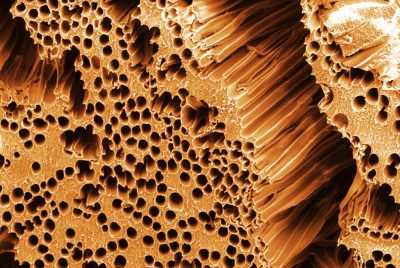 Congratulations to
Congratulations to 
